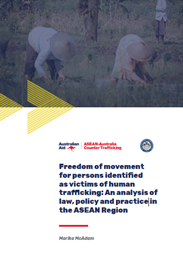Author: Marika McAdam
Sheltering victims of trafficking require a complex balance to be achieved between the rights of victims (including to freedom of movement and liberty), and the sometimes competing interests of other stakeholders. This Study offers insights into the restrictions that are placed on the freedom of movement of victims of trafficking in the ASEAN Region that may result as States responsible for protecting victims and prosecuting traffickers weigh their own interests more heavily than the rights of victims. The Study does not offer a country-by-country analysis; rather, it considers the arguments generally raised in favour of imposing restrictions on victims’ freedom of movement, in light of relevant laws, policies and practices. Limitations in both the scope and depth of the research undertaken mean that the Study does not represent a comprehensive assessment, and instead provides insight into the current situation with the aim of improving understanding of why certain measures are applied and what actions could be taken to address negative outcomes.
There can be no doubt that the issue of freedom of movement for trafficked persons — most particularly foreign victims — is a complex issue for some States. All countries are under pressure to increase prosecutions of traffickers and it is well established that prosecutions rely heavily on the cooperation of victim-witnesses. Permitting freedom of movement to such persons is seen as risking their participation in the prosecution of their exploiters, thereby costing the State an opportunity to bring traffickers to justice. In respect of foreign victims, permitting freedom of movement of those who have been identified as trafficked may be seen as undermining State capacity to effectively manage migration. States restrict trafficked persons’ liberty in pursuit of different purposes and in the service of different interests.
Whether those purposes are valid or not, and how those interests are to be balanced when they come into conflict with those of victims, are questions at the heart of this Study.

